Homesteading, the Final Frontier
The homesteading programs
at Bangor began in 1973 on Maynard and Sally Kaufman's farm, the School
of Homesteading. Its form did evolve some but its core values are
still intact and going strong there today with Maynard and Barbaras apprenticeship
program. A little history and context is in order.
The New Homesteaders,
as Maynard calls these people, are in the tradition of Henry David Thoreau,
Ghandi, and Martin Luther King in that they choose a form of nonviolent
resistance. Dropping out means to be self-sufficient and self reliant.
In this way, participation in a society that is seen as inherently unjust
and destructive, is minimized, 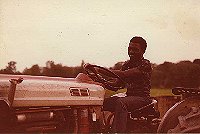 and
the homesteader can be part of the solution, not the problem.
and
the homesteader can be part of the solution, not the problem.
Of course, this last
paragraph may be meaningless babble to many. Motives for pursuing
this lifestyle, so at odds with the prevailing consumer based economy,
probably appeals to a broad base of society. How often do you think
the harried corporate executive has considered throwing in the towel
and migrating to a "simpler",self-sufficient and environmentally friendly
back to the land lifestyle? Many people are not complete unless
they feel that connection between what they do with their mind and hands
and their sustenance (food, heat, etc.). Who hasn't longed to get
up in the morning and know you can have a long fulfilling day outside doing
work that you know directly affects you and your family? 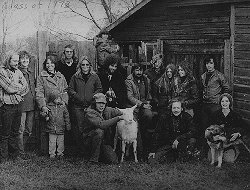
Abraham Maslow taught
us the hierarchy of needs. Basic needs have to be met first, food,
water, security. Because of this, the back to the land movement has
never been much of a savior for poverty stricken people despite initial
impressions. Land to grow ones own food is not accessible for many
of these people and the cultural inpetus is to acquire money to buy the
things that they need. The benefits of self-reliance are applicable
to all people- race, class whatever and connections between people and
the real world (earth, plants , animals, ecosystems, healthy food, etc.)
need to be 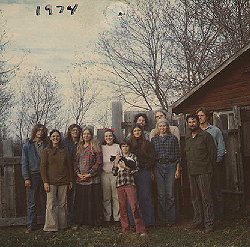 strengthened
regardless of who they are.
strengthened
regardless of who they are.
The reality of the
homesteading movement remains: We are predominantly white and middle
class. Maybe this is appropriate, we still are the center of power,
both in government and economically. It is middle-class whites who
need to rein in their lifestyles to reduce the very negative external
costs, ultimately represented by the emission greenhouse gases(CO2) and
depletion of non-renewable resources.
So, back to 1973,
the 60s were over and american society was changing. Roe v. Wade
had been decided, and other issues of women's rights were on the american
blackboard. . The Vietnam War debacle was winding down and Watergate
was beginning to insinuate its pathos into American culture. The Arab oil
embargo had shocked an already depressed American conscious that not only
were we capable of doing wrong but that the very core of our affluence
was threatened by the rising costs and the finiteness of natural resources.
Earth Day had come and priorities, that were toyed with since Rachel Carson
pointed them out in 1962, were beginning to be incorporated into American
discourse.
So the stage was set
for Maynard Kaufman's and others to push for an alternative to the consumer
based, disconnected, profit oriented economics. The household economy
with its emphasis on labor intensive, low capital and allowing nature
to work for us organic gardening and farming techniques, gives us (more
than a hundred people affected by this homesteading program) a model, old
in its history, but young and exciting to dream.
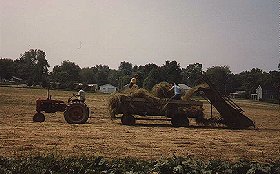 Loading
hay at the School of Homesteading
Loading
hay at the School of Homesteading
Out of those initial
applicants, 10 were selected to attend the 1973 group at the School of
Homesteading. These people stayed 8 months approximating the growing
season with some winter thrown in- May 1 through the middle of Dec.
This enabled Maynard to pay attention to his career as faculty member at
Western Michigan University during the winter months.
A typical day usually
usually had a farm or field work component and a household and
garden component. People rotated around doing different jobs so everyone
sampled everything. The day 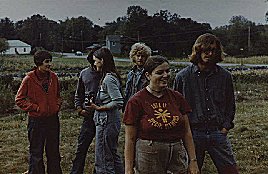 usually
started with chores which included milking cows and/or goats and feeding
the other livestock. A variety of different animals were always present
to provide a diversity of experience. A cooking contingent handled
breakfast. Meals always consisted of home grown produce, (that first
summer, the food consisted of food that Sally had canned the previous growing
season). As you might imagine, the hearty meals were definitely a
highlight of the experience. The day might continue with people learning
and doing cheese making, canning, soap making, ice cream making(mmmm..),
tractor work, gardening(including different methods), barn cleaning (a
highly enjoyable business believe it or not!), field corn planting and
cultivating, haying with a hay loader the old fashioned way, and many more
experiences too numerous to mention (except of course, beer and wine making).
Learning to cook for a large group using farm raised food was an experience,
especially since vegetarian dishes were needed because there were always
a couple of vegetarians present. There were also experiences in the
outside community, such as selling produce from the farm stand or at a
nearby farmers market or attending the monthly Organic
Growers of
usually
started with chores which included milking cows and/or goats and feeding
the other livestock. A variety of different animals were always present
to provide a diversity of experience. A cooking contingent handled
breakfast. Meals always consisted of home grown produce, (that first
summer, the food consisted of food that Sally had canned the previous growing
season). As you might imagine, the hearty meals were definitely a
highlight of the experience. The day might continue with people learning
and doing cheese making, canning, soap making, ice cream making(mmmm..),
tractor work, gardening(including different methods), barn cleaning (a
highly enjoyable business believe it or not!), field corn planting and
cultivating, haying with a hay loader the old fashioned way, and many more
experiences too numerous to mention (except of course, beer and wine making).
Learning to cook for a large group using farm raised food was an experience,
especially since vegetarian dishes were needed because there were always
a couple of vegetarians present. There were also experiences in the
outside community, such as selling produce from the farm stand or at a
nearby farmers market or attending the monthly Organic
Growers of 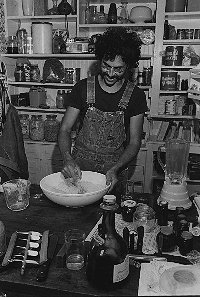 Michigan
meetings.
Michigan
meetings.
Every year was
as different as the people attending were. But the day to day activities
were as similar as they are on a year to year basis on any farm.
This format continued like this through 1977.
In 1977, Maynard and
others persuaded Western Michigan University to add two classes to their
Environmental Studies curriculum. Homesteading Theory was developed
and taught in the classroom by Maynard, and Homesteading Practice, to be
the living learning component to take place on an as yet undetermined farm
Meanwhile, the Michigan
Land Trustees was being formed and a farm was donated by a 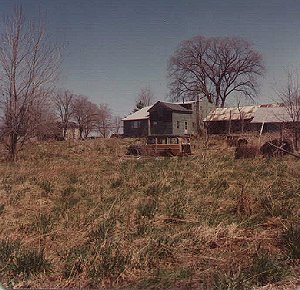 philanthropist,
Joseph Filonowizc, to be used for the purpose of this school. In
the winter of 1978, an instructor, Stu Schafer was hired and the first
Homestead Practice students were selected. By May 1, 5 students
moved onto an old farmhouse at a rundown 36 acre farm(junk strewn) just
down the road from the School of Homesteading. The farm was christened
the Land Trust Homesteading Farm.
philanthropist,
Joseph Filonowizc, to be used for the purpose of this school. In
the winter of 1978, an instructor, Stu Schafer was hired and the first
Homestead Practice students were selected. By May 1, 5 students
moved onto an old farmhouse at a rundown 36 acre farm(junk strewn) just
down the road from the School of Homesteading. The farm was christened
the Land Trust Homesteading Farm.
Although much of the
work that summer was removing junk, cleaning up and painting, they did
produce a market vegetable garden and raise a diversity of farm animals.
While the instructors
changed, and WMU dropped the Homesteading Practice class and their support
in 1980, this reincarnation continued through 1984.
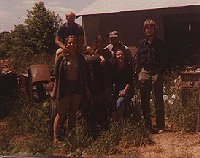 Meanwhile Maynard and Sally continued their School of Homesteading program,
developing more of an apprentice type format, giving a fewer number a more
intense and serious leaning experience. Their milking business developed
into a Grade A dairy and the maple syruping was developed into an income
generating enterprise. Diversity of activities was a major strength
both economically and as a learning experience. Many men and women of diverse
origins passed through staying for various lengths of time from weeks to
months and departed with enriching and practical experiences.
Meanwhile Maynard and Sally continued their School of Homesteading program,
developing more of an apprentice type format, giving a fewer number a more
intense and serious leaning experience. Their milking business developed
into a Grade A dairy and the maple syruping was developed into an income
generating enterprise. Diversity of activities was a major strength
both economically and as a learning experience. Many men and women of diverse
origins passed through staying for various lengths of time from weeks to
months and departed with enriching and practical experiences.
For many, spending
a large block of time providing apparent slave labor without obvious financial
renumeration, would seem a waste of time. I think the experience
had many advantages both to the individual and to society. The individual
acquired practical experiences to enrich and increase skills, such as gardening,
canning, basic equipment maintenance etc. In this day and age where are
minds and 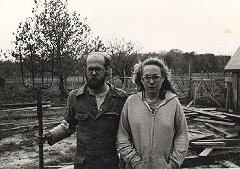 bodies
are exercised separately, small scale farming-homesteading offers an enriching
alternative. Society benefits by the instilling of holistic values of self-reliance
and direct awareness of the circular nature of a healthy environment and
our interactions with it as a species. And on the other side, Maynard and
Sally never benefited financially from this arrangement (you think they
vacationed in Florida every winter?).
bodies
are exercised separately, small scale farming-homesteading offers an enriching
alternative. Society benefits by the instilling of holistic values of self-reliance
and direct awareness of the circular nature of a healthy environment and
our interactions with it as a species. And on the other side, Maynard and
Sally never benefited financially from this arrangement (you think they
vacationed in Florida every winter?).
Maynard and Barbara
at the School of Homesteading continue to carry on the tradition as a living
learning school, but that may change. The Land Trust Homesteading
Farm is now in private hands and is operated as a part time farm-homestead
by my family. Change is a constant and our lives evolve as does our
society. Hopefully the maturation we experience is matched by a maturation
of our society and culture. Is it?
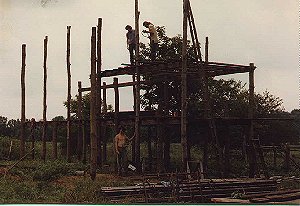 Barn
building in 1980 at the Land Trust Farm
Barn
building in 1980 at the Land Trust Farm
My formative and growing
years happened to have occurred in the mid 1960's. Being a "budding
young scientist" and devouring books on astronomy and paying strict attention
to the space program, the future seemed one of hope for me. I had
no doubt that during the closing few years of the second millennium, we
would be making trips to space as casually as some of us might to Australia.
Bear in mind this is immediately before the events and calamities touched
upon at the beginning of this article. In a world with easy solutions,
unlimited resources, energy, without knowledge of environmental consequence,
such a future would have been possible. Since then, we have learned
of our imperfections and that, in fact, we already live on a starship-
the spaceship Earth. We have much to learn about this craft and
its life-support system. I also happen to think that we can learn much
about this spaceship from learning from its own environment, out in space
appropriately through remote sensing but that is another matter.
Through much of the 1970's, I did some
drifting. I went to school a couple of years after high school, went
to Florida on a motorcycle for almost a year and spent a year in Indianapolis
at a college there. Throughout this period, I made it a point to
come back to my folks farm and be a "homesteading student" for part or
all of the summer and fall. It was not a result of any commitment
to homesteading but a comfortable and fun place to be. I learned
alot about people and made friends but it definitely was not a "career
move". In 1977 and part of 1978 I worked the farm to the north of
the School of 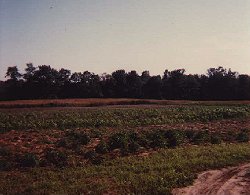 Homesteading
and in the winter of 1979, I went back to WMU and took Environmental Studies
classes and eventually in 1983 graduated with a degree in that and Agriculture.
Anyway, that winter in 1979, I took a class by Dr. John Cooley called "Man's
Place in Nature", an eye opener of a class. I learned and read Thoreau,
John Muir, Aldo Leopold, and Wendell Berry among others. A lot of
writing was done about these books and I felt that I independently and
on my own volition came up with some realizations and something clicked.
A very important book to me was Berry's Unsettling of America, Culture
and Agriculture. The paper, I wrote for that, did wonders for my self
esteem, allowing me to reach my own conclusion about the value of small
scale farming and I include it here, (Ecology
of Mind).
Homesteading
and in the winter of 1979, I went back to WMU and took Environmental Studies
classes and eventually in 1983 graduated with a degree in that and Agriculture.
Anyway, that winter in 1979, I took a class by Dr. John Cooley called "Man's
Place in Nature", an eye opener of a class. I learned and read Thoreau,
John Muir, Aldo Leopold, and Wendell Berry among others. A lot of
writing was done about these books and I felt that I independently and
on my own volition came up with some realizations and something clicked.
A very important book to me was Berry's Unsettling of America, Culture
and Agriculture. The paper, I wrote for that, did wonders for my self
esteem, allowing me to reach my own conclusion about the value of small
scale farming and I include it here, (Ecology
of Mind).
That winter, a new homestead
instructor was hired. As fate would have it, both for Mark Thomas and myself,
Mark had a heart attack the day of his interview. Maynard asked me
to help him out instructing that spring and, except for 2 yrs, I've been
on this 36 acre farm since. 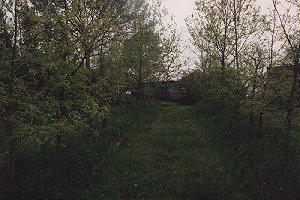
Since 1984 I've focussed
more on making a family than on homesteading. Bobbi and I married in 1985.
I now have a career as an Rn supervisor at a local hospital where I only
work two weekend nights. This leaves me 5 days of being with our kids(Shannon
and Emma), home improvement, gardening, canning, farming and just
plain messing around. I do plant alot of trees every year and usually
have a small tree nursery going. Permaculture is a more developed
form of homesteading in my opinion, and I spent a period learning about
that, hosting a 3 week permaculture design course in 1985. I am,
always have been and always will be, pragmatic, like most people, towards
developing the "perfect lifestyle", being a polluter and consumer like
everyone else is. I'm not about to give up this computer I'm using
or going back to hitchhiking!
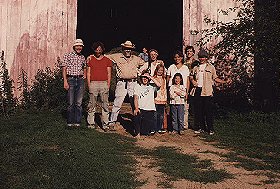 1985
Permaculture Design Course
1985
Permaculture Design Course
The paradigm shift where
everything would become "green", the planet covered with a rich tapestry
of small farms, forests and villages with people living in harmony with
low tech lifestyles fulfilled by their inclusion in the natural world,
hasn't happened. Its not even close. We had thought 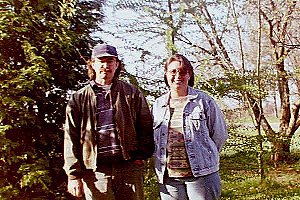 that
oil would have run out by now and force such a change but instead it is
cheaper than ever. Maybe technological solutions do work, can bridge
the
that
oil would have run out by now and force such a change but instead it is
cheaper than ever. Maybe technological solutions do work, can bridge
the 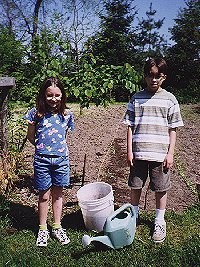 gap
no matter how distasteful they are. Maybe alternative fuels and technology
will add time. Pollution has been allieved for the time being with basic
technological improvements along with conservation. Technologies,
like pesticides, are "innocent until proven guilty" and we will have to
suffer the consequences before meaningful change can occur.
gap
no matter how distasteful they are. Maybe alternative fuels and technology
will add time. Pollution has been allieved for the time being with basic
technological improvements along with conservation. Technologies,
like pesticides, are "innocent until proven guilty" and we will have to
suffer the consequences before meaningful change can occur.
Now we hear that biotechnology,
that ultimate pandora's box, has been even allowed to be included within
the USDA organic standards along with food irradiation. The
organic farmer has been coopted by big business and it is now "mainstream".
All these changes are evolutionary not revolutionary with their success
in doubt.. Meanwhile, local forests are cleared for more blueberries,
Kalamazoo is sending out its cancerous runaway growth down M-43 towards
us, and local poverty is spanning generations and there seems no solution.
The greenhouse effect puts an absolute limit on our consumption and those
ramifications are likely to be immeasurable. Maybe the world will
end in fire.
There are no solutions,
only questions. So everyone, keep asking(I'll work on that too)!
Jon Towne tomar@cybersol.com
Homepage
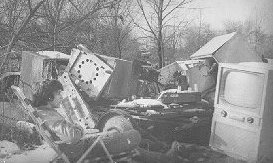 1973, Nathan at Barney's dump... Can be hard to find a tv at the School
of Homesteading
1973, Nathan at Barney's dump... Can be hard to find a tv at the School
of Homesteading
Back to Homesteading, a Compilation
home page
 philanthropist,
Joseph Filonowizc, to be used for the purpose of this school. In
the winter of 1978, an instructor, Stu Schafer was hired and the first
Homestead Practice students were selected. By May 1, 5 students
moved onto an old farmhouse at a rundown 36 acre farm(junk strewn) just
down the road from the School of Homesteading. The farm was christened
the Land Trust Homesteading Farm.
philanthropist,
Joseph Filonowizc, to be used for the purpose of this school. In
the winter of 1978, an instructor, Stu Schafer was hired and the first
Homestead Practice students were selected. By May 1, 5 students
moved onto an old farmhouse at a rundown 36 acre farm(junk strewn) just
down the road from the School of Homesteading. The farm was christened
the Land Trust Homesteading Farm.
 Meanwhile Maynard and Sally continued their School of Homesteading program,
developing more of an apprentice type format, giving a fewer number a more
intense and serious leaning experience. Their milking business developed
into a Grade A dairy and the maple syruping was developed into an income
generating enterprise. Diversity of activities was a major strength
both economically and as a learning experience. Many men and women of diverse
origins passed through staying for various lengths of time from weeks to
months and departed with enriching and practical experiences.
Meanwhile Maynard and Sally continued their School of Homesteading program,
developing more of an apprentice type format, giving a fewer number a more
intense and serious leaning experience. Their milking business developed
into a Grade A dairy and the maple syruping was developed into an income
generating enterprise. Diversity of activities was a major strength
both economically and as a learning experience. Many men and women of diverse
origins passed through staying for various lengths of time from weeks to
months and departed with enriching and practical experiences.
 and
the homesteader can be part of the solution, not the problem.
and
the homesteader can be part of the solution, not the problem.

 strengthened
regardless of who they are.
strengthened
regardless of who they are.
 Loading
hay at the School of Homesteading
Loading
hay at the School of Homesteading
 usually
started with chores which included milking cows and/or goats and feeding
the other livestock. A variety of different animals were always present
to provide a diversity of experience. A cooking contingent handled
breakfast. Meals always consisted of home grown produce, (that first
summer, the food consisted of food that Sally had canned the previous growing
season). As you might imagine, the hearty meals were definitely a
highlight of the experience. The day might continue with people learning
and doing cheese making, canning, soap making, ice cream making(mmmm..),
tractor work, gardening(including different methods), barn cleaning (a
highly enjoyable business believe it or not!), field corn planting and
cultivating, haying with a hay loader the old fashioned way, and many more
experiences too numerous to mention (except of course, beer and wine making).
Learning to cook for a large group using farm raised food was an experience,
especially since vegetarian dishes were needed because there were always
a couple of vegetarians present. There were also experiences in the
outside community, such as selling produce from the farm stand or at a
nearby farmers market or attending the monthly Organic
Growers of
usually
started with chores which included milking cows and/or goats and feeding
the other livestock. A variety of different animals were always present
to provide a diversity of experience. A cooking contingent handled
breakfast. Meals always consisted of home grown produce, (that first
summer, the food consisted of food that Sally had canned the previous growing
season). As you might imagine, the hearty meals were definitely a
highlight of the experience. The day might continue with people learning
and doing cheese making, canning, soap making, ice cream making(mmmm..),
tractor work, gardening(including different methods), barn cleaning (a
highly enjoyable business believe it or not!), field corn planting and
cultivating, haying with a hay loader the old fashioned way, and many more
experiences too numerous to mention (except of course, beer and wine making).
Learning to cook for a large group using farm raised food was an experience,
especially since vegetarian dishes were needed because there were always
a couple of vegetarians present. There were also experiences in the
outside community, such as selling produce from the farm stand or at a
nearby farmers market or attending the monthly Organic
Growers of  Michigan
meetings.
Michigan
meetings.
 bodies
are exercised separately, small scale farming-homesteading offers an enriching
alternative. Society benefits by the instilling of holistic values of self-reliance
and direct awareness of the circular nature of a healthy environment and
our interactions with it as a species. And on the other side, Maynard and
Sally never benefited financially from this arrangement (you think they
vacationed in Florida every winter?).
bodies
are exercised separately, small scale farming-homesteading offers an enriching
alternative. Society benefits by the instilling of holistic values of self-reliance
and direct awareness of the circular nature of a healthy environment and
our interactions with it as a species. And on the other side, Maynard and
Sally never benefited financially from this arrangement (you think they
vacationed in Florida every winter?).
 Barn
building in 1980 at the Land Trust Farm
Barn
building in 1980 at the Land Trust Farm
 Homesteading
and in the winter of 1979, I went back to WMU and took Environmental Studies
classes and eventually in 1983 graduated with a degree in that and Agriculture.
Anyway, that winter in 1979, I took a class by Dr. John Cooley called "Man's
Place in Nature", an eye opener of a class. I learned and read Thoreau,
John Muir, Aldo Leopold, and Wendell Berry among others. A lot of
writing was done about these books and I felt that I independently and
on my own volition came up with some realizations and something clicked.
A very important book to me was Berry's Unsettling of America, Culture
and Agriculture. The paper, I wrote for that, did wonders for my self
esteem, allowing me to reach my own conclusion about the value of small
scale farming and I include it
Homesteading
and in the winter of 1979, I went back to WMU and took Environmental Studies
classes and eventually in 1983 graduated with a degree in that and Agriculture.
Anyway, that winter in 1979, I took a class by Dr. John Cooley called "Man's
Place in Nature", an eye opener of a class. I learned and read Thoreau,
John Muir, Aldo Leopold, and Wendell Berry among others. A lot of
writing was done about these books and I felt that I independently and
on my own volition came up with some realizations and something clicked.
A very important book to me was Berry's Unsettling of America, Culture
and Agriculture. The paper, I wrote for that, did wonders for my self
esteem, allowing me to reach my own conclusion about the value of small
scale farming and I include it 
 1985
Permaculture Design Course
1985
Permaculture Design Course
 that
oil would have run out by now and force such a change but instead it is
cheaper than ever. Maybe technological solutions do work, can bridge
the
that
oil would have run out by now and force such a change but instead it is
cheaper than ever. Maybe technological solutions do work, can bridge
the  gap
no matter how distasteful they are. Maybe alternative fuels and technology
will add time. Pollution has been allieved for the time being with basic
technological improvements along with conservation. Technologies,
like pesticides, are "innocent until proven guilty" and we will have to
suffer the consequences before meaningful change can occur.
gap
no matter how distasteful they are. Maybe alternative fuels and technology
will add time. Pollution has been allieved for the time being with basic
technological improvements along with conservation. Technologies,
like pesticides, are "innocent until proven guilty" and we will have to
suffer the consequences before meaningful change can occur.
 1973, Nathan at Barney's dump... Can be hard to find a tv at the School
of Homesteading
1973, Nathan at Barney's dump... Can be hard to find a tv at the School
of Homesteading